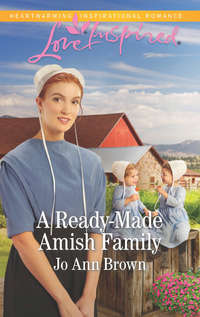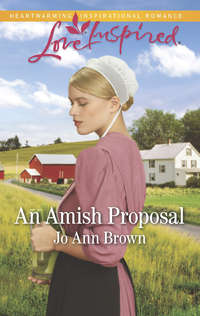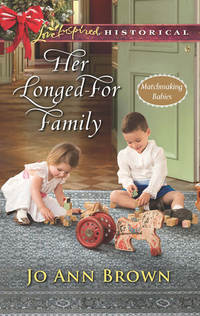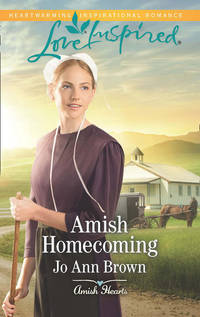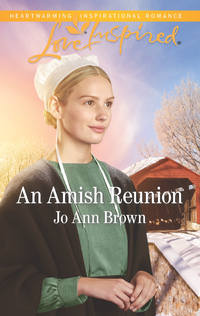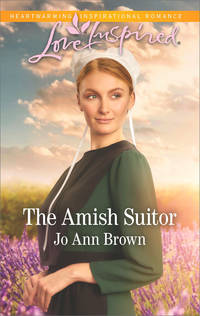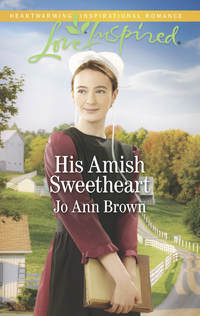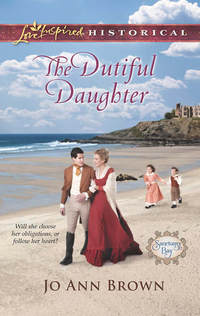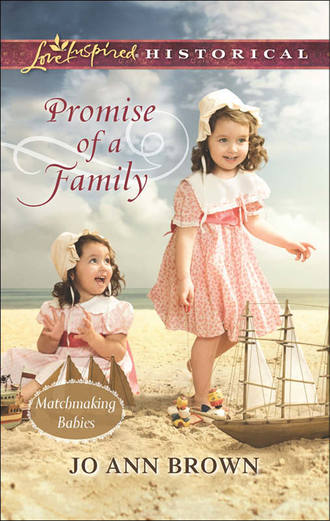
Полная версия
Promise of a Family
“My lord,” Captain Nesbitt said, “time is of the essence.”
She frowned at his lack of compassion.
Before she could say anything, her father replied, “That is true. Please listen closely, Susanna, while I explain what has brought Captain Nesbitt here.” He quickly outlined an astounding tale of a small boat drifting into Porthlowen Harbor carrying a cargo of six small children.
More than once, she swallowed a question as she glanced from Captain Nesbitt to her father and back. Captain Nesbitt nodded each time to confirm what Papa said. Not that she did not believe her father, but the tale was unbelievable.
“Where are the children now?” she asked when her father paused.
“Still on the shore,” Captain Nesbitt answered. “I thought to obtain some guidance before I did anything further.”
“But those poor children must be hungry!” She frowned at Captain Nesbitt. “And frightened and filthy.”
“That is why I ordered my crew to find something for them to eat. My greatest concern is for the youngest child. It cannot be more than a few months old, and it needs a mother’s milk.”
Before she could answer, Papa said, “Susanna, I am certain that putting this problem in your competent hands is the best solution. I trust you and Captain Nesbitt are capable of handling it.”
She opened her mouth to protest. To say she was the wrong one to see to the children. Her reaction had nothing to do with the many tasks she managed in the house. It had everything to do with Captain Nesbitt. She did not like how her heart seemed to beat a bit faster when he looked in her direction. Until she knew she could control that rebellious organ, which had led her to betrayal once, she preferred not to spend a single moment in his company.
But her wishes were unimportant when her father could hardly move. She would do as Papa requested and see to the needs of those abandoned children. She reached for the bell on a table by her father’s chair and rang it. Hard.
Baricoat appeared instantly. The butler had a knack for knowing the family would be ringing for him even before they picked up the bell.
She gave quick orders. A footman was dispatched to have a carriage brought. Another ran to the kitchen with a request for a hearty tea to be ready for the children upon their arrival. A third headed for the village to see if one of the young mothers who had recently given birth would share her milk with a foundling. In the meantime, she had no doubts Mrs. Ford could devise something to feed the baby.
When a maid arrived with a straw bonnet, a pair of kid gloves and a light shawl, Susanna donned them. She walked out of the room, still giving orders to check the nursery that had been closed up since she left it herself years ago. Baricoat offered to prepare a list of what needed to be done to make the nursery suitable for the children.
“Thank you, Baricoat,” she said. Looking over her shoulder, she added, “Captain Nesbitt, aren’t you coming?”
His mouth straightened again, but he spoke a gracious farewell to her father before following her to the entry hall. When the door was opened, a small carriage waited by the front steps.
The coachman handed her into the carriage, then stepped aside to allow Captain Nesbitt to enter. For a moment, the captain hesitated, glancing at the seat where the coachman was settling himself and picking up the reins. Then he climbed in and sat beside her, leaving as much space between them as possible.
She was tempted to tell him that she was no more in favor of the arrangement than he was. Instead, she called to the coachee to get them under way. The sooner she reached the village and collected the children, the sooner she could be rid of Captain Nesbitt. And the sooner she could regain her composure that was jeopardized each time Captain Nesbitt’s dark eyes caught her gaze.
It could not be fast enough.
Chapter Two
The earl’s carriage rattled over rough cobbles as it entered the village, which was a collection of stone buildings. A few hardy plants grew in the lee of them. Drake did not see any trees rising more than ten feet and guessed that storms off the sea were dangerous to anything higher. The village had a smithy, where the smith watched them drive past while his assistant worked over the forge and never looked up. There were a few small shops, including one belonging to a cobbler. Drake resisted looking down at his ruined boots.
During the short ride from Cothaire, Lady Susanna had acted like a constable interrogating Drake for a hideous crime. She fired question after question at him.
“How old are the children?” she asked.
“I am not sure.”
“Girls and boys?”
“Yes.”
Her scowl warned him that she was not in the mood for jests. He was tempted to remind her that he had not asked her to tend to the children from the jolly boat. Her father had.
“Three boys and two girls,” he said. “I don’t know what the baby is, but I am sure it is either a boy or girl.”
“What are their names?” she asked and glanced away as if she found the sight of him intolerable.
“I did not wait to be introduced,” he retorted, vexed at her cool dismissal. Didn’t she realize he was going out of his way to help? He hardly needed the problem of six small children when he should be supervising the work to make The Kestrel seaworthy once more.
“Captain Nesbitt, I am trying to determine how to help the children.” Her voice was far calmer than his had been. “Why are you acting as if this is a game?”
Drake relented. Dealing with the children had upset his plans. No doubt, Lady Susanna had other things to do, as well, though he had no idea what important tasks a fine lady might have.
“Help me understand one thing,” he said.
Lady Susanna had been staring at the square tower on the parish church, and he was unsure if she would give him the courtesy of looking in his direction. When she turned toward him, he was as staggered as he had been in the earl’s smoking room by the unusual color of her eyes. With the strong emotions she was struggling quite unsuccessfully to keep hidden, they gleamed like burnished steel. Everything about her shone from her ebony hair to her pink lips. He could not keep from wondering what she would look like when she smiled. She was a dainty miss, the top of her head not quite reaching his shoulder, but he already had seen she was no fragile flower. Her spine seemed to have been fashioned of stronger stuff than the tin pulled out of the local mines.
“Of course, Captain Nesbitt,” she replied in a tone that suggested saying his name left a bad taste in her mouth.
He shoved his foolish thoughts aside. She did not like him. Well, that was fine. He had no interest in her other than making sure the children were taken care of and the person who put them in the boat paid for that cruelty. It was better, in the long run, for her to dislike him and for him to dislike her. That made it easier not to make the same mistake he had before when he had been beguiled by a pair of pretty eyes.
Never again.
“What do you need to understand?” she asked when he remained silent.
“After we brought the children’s boat up on the sand, I went first to the parson of the Porthlowen church.” His brows lowered. “His surname, if I recall rightly, is Trelawney, just like your family’s. Is that a coincidence?”
“No, it is no coincidence. Raymond Trelawney is my brother.” A hint of a smile added a new light to her eyes, and he guessed her full grin would be scintillating. “The living at the Porthlowen church has always been given to a younger son in the family, and Raymond is well suited for the position. His faith is strong, and he has a compassionate heart.”
“Maybe so, but he was quick to pass the matter of the children from his hands to the earl’s.”
Her smile vanished. “As he should have. My father, Lord Launceston, needs to know when something as astounding as a boatload of babies washing ashore occurs. Everyone knows that, so whoever you had chosen to speak to in Porthlowen would have done the same.”
“If you say so.”
“I do.” She folded her hands primly, her gloves white against the green-sprigged fabric of her gown. “If you are still in Porthlowen on Sunday, Captain, you and your crew are welcome to attend services at our church.”
“Some of my men already have.” He wished he could take back those words when her eyes narrowed.
“But you have not?”
“Not yet. Someone needs to oversee the work my ship needs, and that is the captain.” He did not intend to add more. He believed in God, but his relationship with Him was lackadaisical. He figured if God needed to get his attention, He would. So far, that had not happened.
“I suppose.”
Drake changed the subject that was making them both even more uncomfortable. “I asked Parson Trelawney if anyone had reported any missing children, and he said no.”
Lady Susanna waved in response to a greeting called out to her by a young auburn-haired woman who stood in the doorway of the village’s main shop. The earl’s daughter called for the carriage to stop.
The redhead hurried over. “You have heard about the children?”
“Yes. Captain Nesbitt came to the house to explain how he found them floating in a jolly boat.” She paused, then introduced Drake to the other woman.
Elisabeth Rowse was almost as tall as he was. Her face was plain, but her bright green eyes glowed with intelligence and kindness. When she smiled as she greeted him, her whole face transformed. The mouth that had looked too wide now was an amazing grin.
“I hardly believed what I heard when a lad came to the shop looking to buy milk,” Miss Rowse said. “Six children abandoned in a boat. Have you ever heard of its like, Susanna?”
Drake was astonished how casually Miss Rowse addressed an earl’s daughter, but said nothing until Lady Susanna bade the redhead a good day and ordered the driver to continue toward the strand. His amazement must have been visible, however.
“Elisabeth is betrothed to my brother Raymond,” Lady Susanna said. “They plan to be married soon.” Without a pause for a breath, she continued, “Do you think the children were stolen?”
“It is a possibility.” He would have to be on his toes, because Lady Susanna had a quick, tireless mind. “Overlooking any possibility would be unwise.”
“A horrifying possibility, I must say.”
He nodded as the carriage came around the last building on the street. In front of them, The Kestrel tilted at a steeper angle than earlier. The figurehead on the front, a hawk raising its wings to catch the air, leaned so low that its feathers almost touched the water. Instead of his men plugging the leak, they must have come out to watch him and Benton tug the jolly boat out of the water. He scanned the beach, but there were so many people gathered there that he could not see his men.
“That ship by the quay looks ready to be torn apart and sold for scrap,” she said with a shake of her head. “Why would anyone leave a ship in that condition in our harbor?”
“Because it is being repaired. Before you ask how I know, I will tell you that is my ship.”
“Oh.”
He had startled her, because she did not have a retort.
“It was damaged in battle with a French privateer,” he added when a flattering blush climbed her cheeks. Not being on the defensive with her was a change. “It is nearly repaired, but we discovered another leak today. By the morrow, if all goes well, she will be proudly afloat once more.”
“Was anybody killed?” she asked in a strained voice.
“Not among my men, but a couple of the French pirates did not survive.”
“Papa laments that if the war continues much longer, Napoleon will have the chance to build many more vessels to harry our ships.” She looked back at him, her face troubled.
He wondered if that was the first honest emotion she had shown other than her distaste for him. “Britain and our allies are winning more often than not in the Peninsular campaign.”
“But Boney is a wily adversary with dreams of ruling the world. If he cannot have Spain, he will look elsewhere for lands to make his own. Mark my words.”
Drake smiled in spite of his determination to keep distance between them. Her logic was undeniable, especially as he had argued much the same himself when he and members of his crew sat around the table in the wardroom.
“Everyone in Porthlowen must be on the beach, save for the few we saw along the street,” Lady Susanna said, drawing his attention to the throng on the strand.
“Curiosity is compelling.”
“Especially when this may be the most exciting thing to happen here.” Again she gave him a half smile. “Perhaps ever.”
He nodded. The villagers were accustomed to ships coming and going in every possible condition, and no one in the village had blinked when The Kestrel barely made it to the quay. Even marching the French prisoners of war through the village to where they could be handed off to the local militia to be taken to Dartmoor Prison had caused little more than a slight stir.
A jolly boat filled with children was something else entirely.
“Is that why you are asking all these questions, my lady? Because you are curious?”
Her frown returned. “I am asking because I want to be prepared for what needs to be done to help the children. I prefer not to be surprised.”
The carriage stopped, saving Drake from having to answer. He got out and held up his hand to Lady Susanna before the coachman could. When she placed her slender hand on his much broader one, it was as light as a spring breeze. She stepped out, the fringe on her shawl brushing his arm. A flowery scent teased him, so faint that he had not noticed it until now when she stood beside him, closer than when they had been seated in the carriage.
She withdrew her hand and edged away, looking everywhere but at him. “Captain Nesbitt, if you will lead the way, please.”
He considered offering his arm but told himself not to be addlepated. She was lovely, but he had been betrayed once by a beautiful woman. Not that it mattered. Lady Susanna Trelawney made it clear with every word and action that she considered him a bothersome disruption to her day. Maybe he should be grateful that she was more honest than Ruby had been.
Never again.
“This way,” he said gruffly, vexed at how he had to remind himself of what that big mistake had cost his heart. Simply because a woman smelled delightful was no reason to do more than appreciate the moment.
Drake did not look back as he walked toward the crowd. At first, he thought he might have to elbow past people who failed to move when he said, “Pardon me.”
Then Lady Susanna spoke the same words, and the villagers stepped aside as if they were the Red Sea being parted by Moses. She thanked them prettily, and Drake noticed the men touching their forelocks and the women giving a quick curtsy. The Trelawney family was well respected and perhaps even well loved in Porthlowen. When she assured the onlookers that the children would be taken to the earl’s house, the people thanked her before heading to the village and returning to what they had been doing before word of the jolly boat raced along the street. They obviously thought the matter resolved now that it was in the earl’s daughter’s hands. Maybe there was more to Lady Susanna than he had guessed.
Drake followed in Lady Susanna’s wake through the dispersing crowd and saw most of his crew surrounding the small boat. The children sat on a piece of canvas beside it. Two women who were old enough to be the babies’ grandmothers loitered nearby, handing pieces of cake to them. Another woman of the same age sniffed at the sight before pushing past Drake and Lady Susanna with a mutter about spoiling children.
“Pay Charity Thorburn no mind,” Lady Susanna said under her breath. “From what I have heard, she and the Winwood sisters have not once seen eye to eye in the past fifty years. If one of the sisters said the sea is wet, Mrs. Thorburn would argue it was dry.”
When Lady Susanna turned to greet the Winwood sisters, Drake could not help smiling. Splatters on the children’s shirts and in their hair must have come from the soup Obadiah always had ready in the galley. The elderly cook was on his knees, holding the baby. An absorbent cloth was wrapped around his finger. He dipped it into a bowl by his side; then he placed it in the baby’s mouth to let the infant suckle.
Lady Susanna bent to touch the baby’s head. She smiled warmly at Obadiah, who gave her a toothless grin in return and flushed like a new cabin boy who had stayed too long in the sun.
“ʼTis milk and water and a wee bit of honey,” Obadiah replied to a question Drake had not heard. “ʼTwill fill the mite’s belly for now. My da used the same mixture for lambs when the ewes wouldna let them nurse.”
Thanking him, she turned to where the children regarded her with wide, red-rimmed eyes. They must have been crying the whole time he spoke with the parson and the earl and while he brought Lady Susanna to the beach. He was grateful the older women had come with fresh cake. He thanked them as Lady Susanna sank to her knees beside the boat and put her hand on it as she greeted the children.
“Who is she?” asked Benton quietly as he appeared at Drake’s elbow. “Are there more like her in the village?”
Drake scowled his first mate to silence, then said, “She is Lady Susanna Trelawney, the earl’s daughter.”
Arching his brows, Benton whistled softly.
He did not have a chance to reply because Lady Susanna motioned for him to join her. Aware of the eyes of his crew and the few remaining villagers on them, he pushed down his resentment that she crooked her finger at him as if he were a dog trained to obey.
He squatted beside her and saw one of the older boys pinch the other one again. The second boy let out a shriek that was more anger than pain. He scooped up the two boys and carried them to Benton.
“Keep them apart,” he ordered as he set them at his first mate’s feet.
In an instant, the two boys were taunting each other and poking each other and ready to come to blows.
“How?” asked Benton, trying to pull them away from one another.
Drake shrugged. “You can handle a whole crew of cantankerous sailors. Two small boys should not be too great a task for you.”
When he turned to go back to where Lady Susanna was talking in a hushed voice to the remaining children, he wondered if Benton realized that Drake had given him the easier chore. At least his first mate did not have to work alongside a woman who made no secret that she longed to be rid of him.
He wished he could say the feeling was mutual, but she intrigued him. Her hand gently cupped a tear-streaked face as she leaned toward the children. Behind her cool exterior, she had a gentle heart. So why was she revealing that to everyone but him?
* * *
Captain Nesbitt was definitely correct about one thing, Susanna decided. The two toddler girls, who looked to be around two and a half years old, were identical. They must be twins. With their fine black hair and dark green eyes, they would catch every man’s attention once they were grown. Now they were frightened children surrounded by strangers.
Pointing to herself, she said, “I am Susanna.”
The twins looked at each other and at a younger boy who was struggling to stay awake. Before he could tip over, Susanna picked him up and set him on her lap. She touched his forehead, but no hint of fever suggested he might be ill. She must check each child for signs of sickness, though if one was ill, they all probably would soon be. She wondered how long the youngsters had been in the boat. Their faces were red from the sun but not blistered. Either they were accustomed to the sun off the sea or they had been drifted quickly into Porthlowen Harbor after being set afloat.
“I am Susanna,” she repeated to the twins. “Who are you?”
“Wufry,” one of the little girls said.
“Ruthie?” asked Captain Nesbitt as he came to kneel beside Susanna. He held out his hands for the little boy.
Susanna shook her head because he had fallen asleep, and she did not want to disturb him until she must.
“Wufry.” The little girl scowled at Captain Nesbitt. “Wufry!”
In a hushed voice, he said, “The females around here must learn that facial expression early.”
“What?” She looked at him and found he was so close to her that she could not see anything beyond his broad shoulders. As she raised her gaze to his, everyone else on the shore seemed to fade into the distance. Could one disappear into the brown depths of another’s eyes?
Then he grinned. “Her irked frown is just like yours.”
Susanna gasped, knowing she should chide him for his rudeness, but she had been sent to help the children, not to teach Captain Nesbitt proper manners. Heat raced up her face when she recalled how many were watching and might have overheard his whisper. The best course of action would be to collect the children and return to Cothaire posthaste.
“Wufry!” insisted the little girl again.
Lord, Susanna prayed, open my understanding as well as my heart to these children You have brought forth out of the sea. She shuddered when she thought of how easily they could have died before reaching Porthlowen. Let me help them now and please guide me in tending them as carefully as You guided them to safety.
Listening closely to the little girl, she repeated the child’s word over and over in her mind. She smiled and asked to give herself more time to decipher the name, “So your name isn’t Georgie?”
“No.” The child smiled, and the little girl beside her looked at Susanna for the first time. “Wufry.”
“And I guess your name isn’t Aloysius, either.”
Both twins giggled.
When Captain Nesbitt started to speak, Susanna waved him to silence with a curt motion. He scowled but nodded. Good. He could be reasonable.
“Wufry!” said the little girl again.
Hoping her first real guess would be right, Susanna took a deep breath and said, “So your name must be Lucy.”
The little girl grinned, showing gaps in her baby teeth. She flung her arms around Susanna’s neck, tugging her toward the boat. The edge cut painfully into her ribs because she protected the sleeping boy from the splintered wooden side.
“Me Wufry.” The toddler pointed to her sister. “She Mowie.”
“So you are Mollie,” Susanna said after repeating the word in her mind. She smiled at the other twin, who seemed shier than her sister. “Lucy and Mollie. Two very pretty names. Captain, will you assist Miss Lucy and Miss Mollie to the carriage?”
He reached for Lucy. His nose wrinkled as he took her hand and then reached for her sister’s. Both were in need of a change of clean clothes and fresh napkins because the ones they wore were soaked.
Susanna stood, balancing the little boy against her. He stank, too, but she had smelled worse.
Her gaze met Captain Nesbitt’s over the children’s heads. A smile quirked at his lips, and she found herself returning it. Something lit in his eyes, something powerful. She should look away. She could not. She was held by his gaze as surely as if he held her in his arms. A shiver ran through her at that thought. Not an icy shiver, but a heated one.
A small hand tugged at her bodice, and, grateful that she could break the connection between her and Captain Nesbitt, Susanna looked down to see the little boy was awake.
“Gil.” The smallest boy jabbed a finger at his chest.
“You are Gil?” she asked.
He nodded and ordered, “Down!”
“As you wish.” She set him on the ground. When she straightened, she saw the playful twinkle in Captain Nesbitt’s eyes. No doubt he recognized Gil’s tone because it sounded much like his arrogant one.
Why was she letting the ship’s captain slip into her thoughts so often? Her focus should be on the children and discovering why they had been floating in a jolly boat in Porthlowen Harbor.


